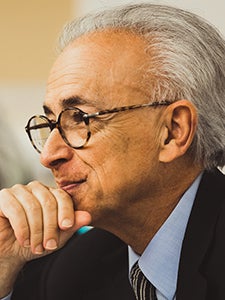French Honors
Two USC Dornsife professors have received honorary degrees from the Université Paris Descartes — more widely known as the Sorbonne — for their pioneering work in psychology.
University Professor Antonio Damasio, David Dornsife Chair in Neuroscience and professor of psychology and neurology, and University Professor Hanna Damasio, Dana Dornsife Chair in Neuroscience and professor of psychology and neurology, traveled to Paris to receive the Doctor Honoris Causa degrees at a formal ceremony held at the Sorbonne on Sept. 17.

University Professor Hanna Damasio, Dana Dornsife Chair in Neuroscience and professor of psychology and neurology, and co-director of the USC Dornsife Brain and Creativity Institute.
The Damasios, who are married, co-direct the USC Dornsife Brain and Creativity Institute. The honorary degrees were proposed by the Paris university’s faculty of psychology. The academic discipline has been one of the grand scientific traditions at the Sorbonne, where pioneers like Alfred Binet and Jean Piaget helped create and shape the field.
The day before receiving their honorary degrees, Hanna and Antonio Damasio lectured to the full faculty and the student body of psychology at the Sorbonne on the topic of their careers in cognitive neuroscience.
“The Sorbonne is one of the cradles of psychology,” said Antonio Damasio. “We are honored to be associated with that history.”
Hanna Damasio agreed, paying tribute to the many illustrious women scientists associated with the world-renowned Paris institution, the most celebrated of whom is the physicist Marie Curie, who was twice awarded the Nobel Prize, once for physics and once for chemistry.
“When it comes to women scientists, the Sorbonne is a pioneer,” Hanna Damasio said. “I am pleased to be a part of that tradition.”

University Professor Antonio Damasio, David Dornsife Chair in Neuroscience and professor of psychology and neurology, and director of the USC Dornsife Brain and Creativity Institute.
Using computed tomography scanning and magnetic resonance imaging, Hanna Damasio has developed methods of investigating human brain structure and studied functions such as language, memory and emotion. Her research has employed both the lesion method, which uses lost or damaged parts of the brain to identify correlations between a specific brain area and a behavior, and functional neuroimaging, which uses neuroimaging technology to measure aspects of brain function.
She is the author of Human Brain Anatomy in Computerized Images (Oxford University Press, 1995), the first brain atlas based on computerized imaging data, now in its second edition.
Antonio Damasio received another Gallic honor this summer when the French magazine Sciences Humaines included him in its list of “50 Major Thinkers in the Human Sciences” of the past two centuries, alongside Sigmund Freud, Charles Darwin, Michel Foucault and Claude Lévi-Strauss.
Cited more than 124,000 times, he was also included in the list of “100 Most Eminent Psychologists of the Modern Era” in an article published by the Archives of Scientific Psychology.Damasio’s book Descartes Error (G.P. Putnam’s Sons, 1994) was among the 50 highest cited publications written by the authors in that list.
An internationally recognized leader in neuroscience, Antonio Damasio has made seminal contributions to the understanding of brain processes underlying emotions, feelings, decision making and consciousness. His research has helped to elucidate the neural basis for the emotions and has shown that emotions play a central role in social cognition and decision making. His work has also had a major influence on current understanding of the neural systems that underlie memory, language and consciousness.